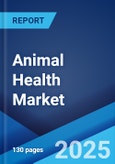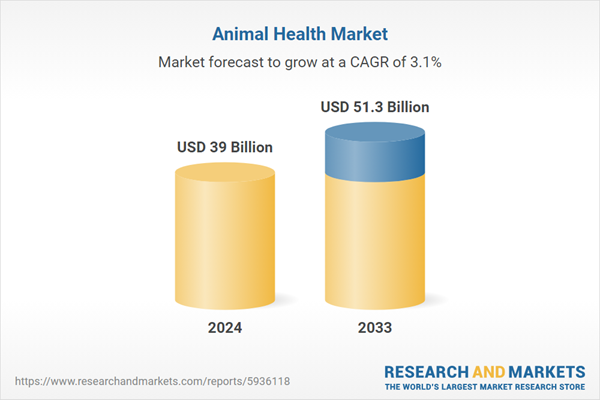Animal health refers to the state of well-being and proper functioning of animals, both domestic and wild. It encompasses the physical, mental, and behavioral aspects of animals, emphasizing their overall health and quality of life. Ensuring animal health involves taking various measures, such as preventive healthcare, timely vaccinations, appropriate nutrition, and regular veterinary care. Proper management of animal health is essential for the welfare of individual animals and for preventing and controlling the spread of diseases that can impact both animal and human populations. As a result, animal health plays a crucial role in supporting sustainable agriculture, wildlife conservation, and the human-animal bond in society.
The rising demand for animal protein and the growing pet ownership rate will stimulate the growth of the market during the forecast period. Moreover, the heightening awareness of zoonotic diseases and the One Health approach have emphasized the importance of preventive care and disease management in animals. In line with this, extensive investments in research and development (R&D) of new and improved animal health solutions are positively influencing the market growth. Apart from this, numerous technological advancements in veterinary medicine, such as innovative diagnostics, pharmaceuticals, and treatment modalities that enhance the effectiveness of animal health interventions, has augmented the demand for advanced veterinary products. Additionally, favorable government regulations and initiatives aimed at promoting animal welfare and biosecurity are propelling the market growth. Besides this, the increasing focus on food safety and quality has accelerated the adoption of animal health products in livestock production to ensure healthier and safer food supply chains. Furthermore, the inflating consumer spending on pet care due to rising disposable incomes in emerging economies is contributing to the market growth.
Animal Health Market Trends/Drivers:
Increasing focus on preventive healthcare
The animal health industry is experiencing a significant shift toward preventive healthcare practices for both companion animals and livestock. Pet owners and livestock producers recognize the importance of early detection and proactive management of health issues to improve overall animal well-being and reduce the risk of diseases. Regular veterinary check-ups, vaccinations, and tailored health management plans are becoming commonplace. This trend is fueled by a desire to enhance the quality of life for animals and minimize the economic impact of disease outbreaks in livestock production. As a result, there is a growing demand for preventive animal health products, including vaccines, parasiticides, and nutritional supplements.Advancements in biotechnology and pharmaceuticals
The animal health sector is witnessing remarkable advancements in biotechnology and pharmaceuticals, transforming the way diseases are diagnosed and treated in animals. Cutting-edge research and innovative technologies have led to the development of specialized therapies, vaccines, and precision medicine tailored to specific animal species and conditions. Biotechnological breakthroughs, such as gene editing and cell-based therapies, offer promising solutions for challenging diseases. Additionally, pharmaceutical companies are investing in research and development (R&D) to create more effective and safer medications for animals. These advancements improve treatment outcomes and contribute to the overall efficiency of animal healthcare. Veterinary professionals can now offer more targeted and personalized treatment plans, leading to better outcomes and enhanced quality of life for animals under their care.Growing pet humanization and specialty pet care
The evolving relationship between humans and their pets has led to a phenomenon known as pet humanization. Pets are increasingly regarded as integral family members, resulting in a significant shift in consumer behavior in the pet care market. Pet owners are now willing to spend more on premium and specialized pet care products and services to ensure their beloved companions lead healthy and fulfilling lives. This trend has catalyzed the demand for high-quality pet nutrition products, personalized treatments, and advanced veterinary care. The availability of a wide range of specialty products, such as organic pet food, customized supplements, and pet-specific medical treatments is propelling the growth of the market for animal health.Animal Health Industry Segmentation:
The publisher provides an analysis of the key trends in each segment of the global animal health market report, along with forecasts at the global and regional levels from 2025-2033. Our report has categorized the market based on animal type and product type.Breakup by Animal Type:
- Commercial
- Companion
Commercial holds the largest share in the market
A detailed breakup and analysis of the market based on the animal type has also been provided in the report. This includes commercial and companion. According to the report, commercial accounted for the largest market share.The commercial segment typically includes animals, such as livestock and poultry, that are reared for commercial needs like milk and meat. Producers and farmers are increasingly focused on maintaining the health and productivity of their herds or flocks due to the rising demand for animal-derived products, including meat, dairy, and eggs. Healthy animals lead to higher yields and improved product quality, which directly impacts the profitability of commercial operations. To achieve optimal productivity, producers are investing in preventive healthcare measures, like vaccinations, parasite control, and disease management. This in turn, has augmented the demand for a wide range of animal health products, such as vaccines, pharmaceuticals, feed additives, and hygiene solutions. The rising collaboration between commercial animal producers and veterinary professionals ensures the implementation of best practices in animal health management, thus favoring the market growth.
Breakup by Product Type:
- Pharmaceuticals
- Biologicals
- Medicinal Feed Additives
- Diagnostics
Pharmaceuticals represent the most popular product type
The report has provided a detailed breakup and analysis of the market based on the product type. This includes pharmaceuticals, biologicals, medicinal feed additives, and diagnostics. According to the report, pharmaceuticals represented the largest segment.Pharmaceuticals refer to essential medications and therapies used to address a wide range of health conditions in animals. These pharmaceutical products cater to both companion animals and livestock, helping prevent and treat diseases, manage chronic conditions, and enhance overall animal well-being. Veterinary pharmaceutical companies are investing heavily in research and development (R&D) to create innovative and effective drugs tailored to specific animal species and health needs, thereby contributing to the segment growth. Moreover, continuous advancements in pharmaceutical technologies, such as controlled-release formulations and personalized medicine, further optimizes treatment outcomes. Additionally, pharmaceutical companies are collaborating with veterinarians, animal owners, and regulatory authorities to ensure product safety, efficacy, and compliance with stringent quality standards. Furthermore, the increasing demand for animal healthcare and the growing importance of preventive medicines are propelling the market growth.
Breakup by Region:
- North America
- Europe
- Asia Pacific
- Middle East and Africa
- Latin America
North America exhibits a clear dominance in the market
The report has also provided a comprehensive analysis of all the major regional markets, which include North America, Europe, Asia Pacific, Middle East and Africa, and Latin America. According to the report, North America accounted for the largest market share.North America held the biggest share in the market since the region has a large population of pet owners who prioritize the health and well-being of their companion animals, which has augmented demand for veterinary products and services. Moreover, the expanding livestock industry in North America fuels the need for animal health solutions to ensure the health and productivity of the commercial animal sector. Additionally, the presence of leading pharmaceutical companies and research institutions in the region that fosters continuous innovation in animal health products, including vaccines, pharmaceuticals, and diagnostics has catalyzed the market growth. Another major contributing aspect is the introduction of supportive government regulations and initiatives promoting animal welfare and biosecurity, encouraging investments in the animal health industry, thereby propelling the market growth.
Competitive Landscape:
The market is experiencing steady growth as key players are introducing several cutting-edge innovations to address evolving challenges and enhance animal care. They are developing advanced vaccines and therapeutics targeting specific diseases prevalent in both companion animals and livestock. Additionally, novel diagnostic tools employing advanced technologies, such as DNA testing and point-of-care devices, have been introduced by manufacturers to enable faster and more accurate disease detection. Key players are also investing in telemedicine and digital health solutions, facilitating remote consultations and personalized treatment plans for pet owners. Furthermore, the integration of data analytics and artificial intelligence (AI) technologies has improved decision-making in animal health management, optimizing treatment protocols and predictive modeling. These latest innovations by leading players in the market reflect their commitment to delivering state-of-the-art solutions and driving the animal health industry toward a more efficient and compassionate approach to animal care. We also expect the market to witness new entrants, consolidation of portfolios, and increased collaborations to drive healthy competition within the domain during the forecast period (2025-2033).The report has provided a comprehensive analysis of the competitive landscape in the market. Detailed profiles of all major companies have also been provided.
Some of the key players in the market include:
- Bayer
- Elanco
- Merck
- Merial
- Zoetis Inc.
- Biogenesis Bago
- Boehringer Ingelheim
- Ceva Sante Animale
- Heska
- Neogen
- Novartis
- Thermo Fisher Scientific
- Vetoquinol
- Virbac
Key Questions Answered in This Report
1. What was the size of the global animal health market in 2024?2. What is the expected growth rate of the global animal health market during 2025-2033?
3. What are the key factors driving the global animal health market?
4. What is the breakup of the global animal health market based on the animal type?
5. What is the breakup of the global animal health market based on the product type?
6. What are the key regions in the global animal health market?
7. Who are the key players/companies in the global animal health market?
Table of Contents
Companies Mentioned
- Bayer
- Elanco
- Merck
- Merial
- Zoetis Inc.
- Biogenesis Bago
- Boehringer Ingelheim
- Ceva Sante Animale
- Heska
- Neogen
- Novartis
- Thermo Fisher Scientific
- Vetoquinol
- Virbac. etc.
Table Information
| Report Attribute | Details |
|---|---|
| No. of Pages | 130 |
| Published | January 2025 |
| Forecast Period | 2024 - 2033 |
| Estimated Market Value ( USD | $ 39 Billion |
| Forecasted Market Value ( USD | $ 51.3 Billion |
| Compound Annual Growth Rate | 3.1% |
| Regions Covered | Global |
| No. of Companies Mentioned | 14 |









